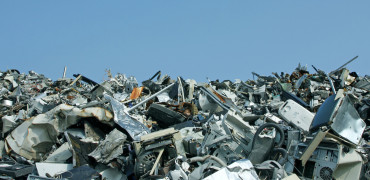Around the world companies have had to transform the way they do business, shifting colleagues from the office workplace to homeworking and providing them with new tools to carry out their roles, and the new balance between the personal and the professional has required greater flexibility from both sides.
Many of the changes we've seen have been beneficial to Sustainability; a good example is the approximate 1.8 million business miles that we as a company in the UK have saved over the last year.
It is clear that the changes and innovations we have seen over the past year will have a lasting impact, though it is difficult to predict exactly what these will be.
What we can be certain of though is that the 'new-normal' will not simply be a rebrand of the old.
I can see most change occurring here as our houses have become far more than just our homes
Redesigned offices
The office spaces of the future will have to be re-thought – not just in terms of health and safety, but with greater value placed upon the real benefits of shared workspaces for an organisation; Culture, Community and Collaboration.
Back in August, the BBC explored some ways that the office of the future would look with a feature that followed an employee on her way to work for the one day a week she went into the office.
The article predicts that staggered working cuts back on the amount of people needing to travel at the same time – but this could also require a change to the start time for schools, so nothing is simple or straightforward.
Her attendance is purely for physical meetings with clients and colleagues as otherwise she can be more effective working from her screen at home
And the business has downsized its office, moving into modern, energy efficient ones.
Not there yet
The BBC tale then delves into fiction, because although the technology mentioned certainly exists, it is not cheap enough or commonplace enough at this point to be effective.
We see the employee get her temperature taken as her faced is scanned for security purposes. All of this minimises the physical contact with surfaces and this space and touching element is continued as she enters the work space via the voice activated elevator with a maximum of two occupants.
The offices have been redesigned with wider corridors and hand sanitizer everywhere and have easy to clean, antimicrobial furniture and surfaces.
Meetings are still socially distanced and there is plenty of space with separations by plastic screens or natural planting
For me, I’m a little sceptical of how obsessed with ‘clean’ society will remain should we manage to vaccinate everyone.
The BBC article predicts air conditioning which uses ultra violet light to kill any pathogens and I can certainly see more use of filtration and air ‘cleaning’, which is easier to manage than relying on individuals to continue to wash their hands!
But once we have vaccinated just about everyone, will we continue to see hand sanitsers and face masks in common use? I’m not so sure.
Back to work
What is pretty clear is that we will see a physical return to work once society is deemed safe enough. The need for physical interaction with colleagues and customers is something I think will hasten the drive back to work.
What we need to work out is: 1) how to avoid those rush hour blues? and 2) what is the most effective operation for each person and each business?
I know some teams that feel they are more effective working together and others who relish undisturbed time on their own, so I think we will probably reach the stage where some will go back to the majority days being office-bound with others popping in for meetings.
The article also looks at the changes the employee has made to her home, which is now larger and in the suburbs as she can cope with a longer commute as it’s only one day a week.
Here is where I can see most change occurring as our houses have become far more than just our homes.
This year they have been schools, gyms, restaurants, offices and some might even say ‘prisons’. Many people have upgraded their homes spending money saved from not going on holiday and I can see this trend continuing as people focus on where they are for 50 weeks of the year, rather than obsessing about where they will go for 2 weeks of the year.
In conclusion
Will we all rush back into the office? Do we even need to? And what will that do for all that real estate?
Why would we want to rush back into the rush hour crush if we don’t need to? Anyone and everyone could see what a difference the lack of traffic made to the environment during the global lockdown.
And has the last year changed our relationship with our homes?
For me it seems quite clear that things have fundamentally changed and for the most part, as far as the environment goes, these changes are for the better.
Jack Bain is a member of the sustainability team


